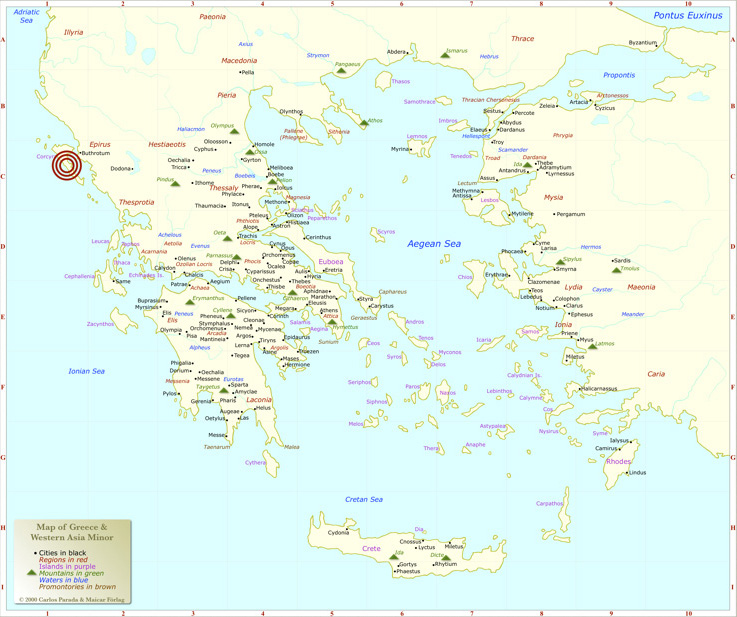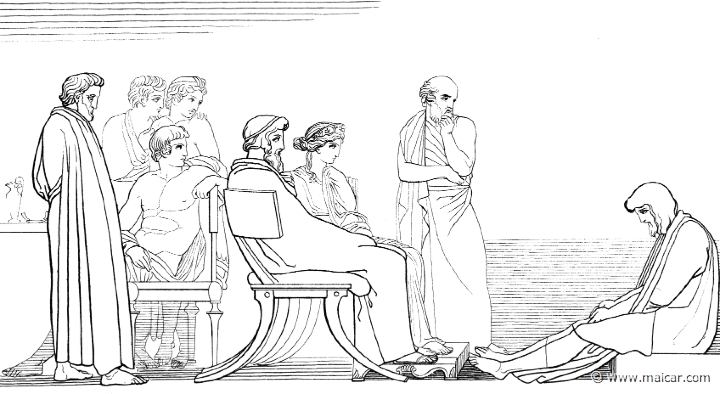|

|
Location of Corcyra, believed to
be the island of the Phaeacians
|
|
The island of the Phaeacians, which is in the
Ionian Sea off the coast of Epirus, was originally
called Drepane (Sickle-island), but later was
called called Scheria, and Corcyra.
To this island emigrated Macris, a nurse of Dionysus 2, when Hera drove her from Euboea.
This is the reason why Corcyra was also called
Macris Isle, to be distinguished from Abantian
Macris, which was Macris' first residence in the
island of Euboea.
It has also been told that when Heracles 1 arrived to the island in order to cleanse himself for having murdered his children by Megara, he there made love to the naiad Melite 2, daughter of the river god Aegaeus, and that their child Hyllus 1 was born in the isle of the Phaeacians.
The name Phaeacians, some say, derives from Phaeax 1, son of Poseidon and Corcyra and father of King Alcinous. That could be so, but others assert that King Alcinous was the son of Nausithous 1, who once ruled the Phaeacians and was the man who settled them in the island of Scheria, having fled from the CYCLOPES (or from those other Cyclopes resembling them) because they plundered them. Nausithous 1 himself was son of Poseidon and Periboea 1, the youngest among the daughters of Eurymedon 2, who is said to have once been king of the GIANTS, and the one
responsible of bringing destruction on his people
and on himself.
King Nausithous 1 had two sons, Rhexenor 2 and Alcinous. Rhexenor 2, who was killed by Apollo, was the father of
Arete, who married her uncle Alcinous. While
Alcinous was king of the Phaeacians, he received
the ARGONAUTS, who had
stolen from Colchis the Golden Fleece, and he also
protected the Colchian princess Medea, who being in love
with Jason, captain of the ARGONAUTS, accompanied
them. The Colchians who pursued them demanded of
Alcinous that he should give Medea up, for she was also accused of having murdered her brother Apsyrtus. The king answered their demand declaring that if she were still a maid, he would send her back to her father, King Aeetes of Colchis, but that if she already had slept with Jason, he would give her
to him. It was then that Queen Arete, anticipating
matters, married Medea to Jason.
|

|
Odysseus in the court of Alcinous and Arete | od147flax: "Odysseus sat down on the hearth in the ashes by the fire, and they were all hushed in silence." (Hom.Od.7.153). John Flaxman (1755 – 1826).
|
|
Years later, the shipwrecked Odysseus, on his
homeward way from Troy,
landed on a Phaeacian beach, where he was
discovered by Alcinous' daughter Nausicaa, who had gone there to wash clothes. At this time, the city was surrounded by high battlements, and had two harbors, the Phaeacians being excellent navigators. The king's palace was a splendid building with doors of gold and walls of bronze topped with enamel tiles. The entrance was protected by gold and silver dogs that served as sentries, and outside the courtyard there was a large orchard where there grew pear, pomegranate, apple, fig, and olive trees that gave fruit of the best quality at all seasons of the year. The same was in their vineyard, for while some grapes dried in the sun, others were gathered or being trodden, and still others were unripe. The Phaeacian chiefs enjoyed their great food and wine in a large hall, where
youths of gold held flaming torches to light them
by night.
This blessed realm, where the gods used to show
themselves without disguise when attending the
Phaeacian banquets, was the last foreign land Odysseus visited before returning to Ithaca. It was here that he found assistance, and King Alcinous, after bestowing gifts on him, sent him home in a Phaeacian ship, constructed with superior knowledge, for the vessel had neither steersmen nor steering-oars, and knew by itself what the crew was thinking and proposed to do. |